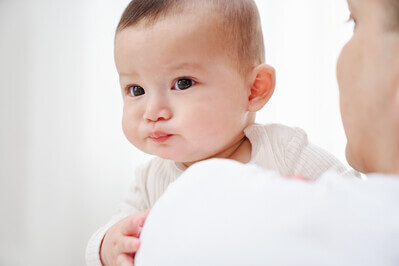
Different babies have different growth rates
You might notice that your baby is not gaining weight and wonder if he is drinking breast milk appropriately or not. You might even think that breast milk alone isn’t enough.
The fact is that different babies grow at different rates. Some babies grow at a slower pace and some of them might grow slowly regardless of the amount of breast milk they have. There is no need to worry about it.
It has also been found that newborn babies lose almost 10% of body weight during the first few days after birth.
The reason behind this weight loss is that babies get rid of excess fluids which they retain during their time inside the uterus.
It takes about 2 to 3 weeks for babies to get back to normal weight provided that the breastfeeding goes smooth.
Determining if the baby is growing adequately
There are ways to check if your baby is gaining weight apart from noticing the amount of breast milk he drinks, these include monitoring the baby’s energy, how much urine he passes, the way your baby drinks breast milk, the rhythm in breastfeeding. In addition to these, it is important to understand how to determine the amount of breast milk the baby is getting.
Signs such as the baby not being energetic enough, the baby not drinking milk frequently, diapers not getting wet often, less frequent bowel movements, strange breastfeeding rhythm, and longer breastfeeding sessions, are not good signs so if you notice any of these, consult a doctor or a midwife.
If your baby doesn’t gain weight frequently and steadily, the reason can be that the baby isn’t having enough breast milk. You should consult a doctor in this case and not try to judge by yourself.
Signs of a baby having enough breast milk
- The baby is breastfeeding around eight times a day.
- His rhythm will slow down as the milk is released and you can hear a gulping and swallowing sound.
- The baby has good muscle tone and is agile.
- The baby stays content between breastfeeding cycles.
- The baby wets about six to eight diapers in a day, the urine should be pale and diluted.
- Bowel movements should stay consistent at least three times per day. Stooling will not be as frequent as the baby grows.
- The baby consistently gains weight averaging around 18-30 grams per day.
- The mother’s breasts may feel full before breastfeeding and may seem a bit soft after breastfeeding. This is not the case for every mother.
(Source: UNICEF WHO, “UNICEF/WHO Breastfeeding Management and Promotion in a Baby-Friendly Hospital, an 18-hour course for maternity staff”, 1993, p. 68).
Signs that a baby is not gaining appropriate amount of weight
- He is gaining less than 18 grams per day.
- By the third week, the baby hasn’t yet recovered the birth weight.
- The baby relatively has a straighter line on the growth curve.
- The baby sleeps for longer periods in order to conserve energy.
- The baby has a high-pitched cry and is quite lethargic.
- The baby’s urine output is low and is relatively concentrated.
- Urine output alone cannot be considered as a measure of a baby’s weight gain.
- The baby’s stooling is less frequent.
- The baby stays at the breast for longer periods.
- The baby looks worried.
(Source: UNICEF WHO, “UNICEF/WHO Breastfeeding Management and Promotion in a Baby-Friendly Hospital, an 18-hour course for maternity staff”, 1993, p. 69).



